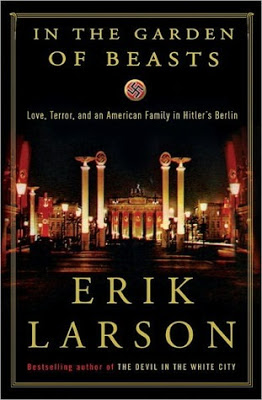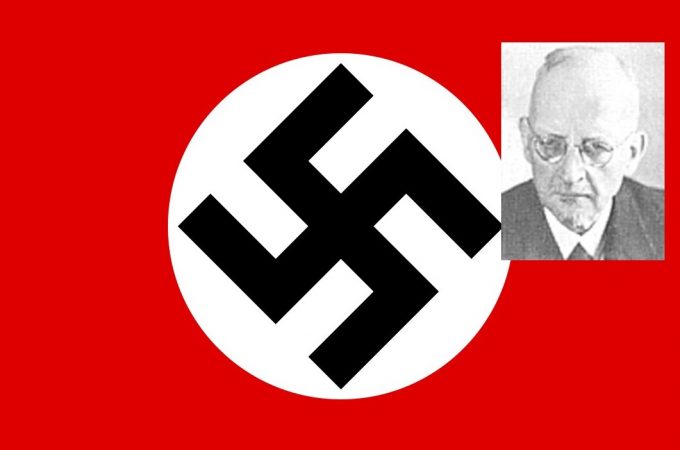How Gerhard Kittel twisted truth to accommodate the spirit of the age
We are living at a time of dramatic change for hundreds of millions of people. This change is driven by two forces. One is postmodernism, born in Germany between the two world wars. More recently, a growing nationalism is challenging the old internationalism, that mainstay of global politics and economics.
 To understand our times, I am reading history of another time of global upheaval, i.e. that which began with the rise of the Third Reich. If we do not learn from history, we are likely to repeat it.
To understand our times, I am reading history of another time of global upheaval, i.e. that which began with the rise of the Third Reich. If we do not learn from history, we are likely to repeat it.
I recently finished Erik Larson’s, In the Garden of the Beast, about the tenure of US Ambassador William Dodd to Nazi Germany, 1933-1937. Americans generally, and the US State Department in particular, were blind to events unfolding before their very eyes. Why? They wanted to put the best spin on the Third Reich.
About a year ago, we wrote on Gerhard Kittel, the renowned biblical scholar who became the Nazi theologian. Robert Erickson’s book, Complicity in the Holocaust: Churches and Universities in Nazi Germany, sheds light on how this could happen.
Erickson says that Kittel’s scholarship in the 1920s led him to esteem the Jews. But less than a decade later, Kittel’s posture toward the Jews had eroded from benign respect to profound animus. In the end, he became the Nazi theologian.
The year 1933 became a watershed. Jews began to flee Germany, and intellectuals joined the Nazi party; Gerhard Kittel in May. On June 1, he gave a defining speech at Tübingen University titled “The Jewish Question.” (See Death of God: Nazi Theology in Gerhard Kittel.) His remarks were published and circulated throughout Germany. This speech was a defining moment in Kittel’s life, and in the nation.
Kittel put culture over scripture
A few days later, Kittel felt the need to clarify things he had said. For example, how could a Christian in general, and he as Christian scholar, seek to justify a growing national anti-Semitism? He wondered
… whether such a radical set of laws against Jews is necessary and just … whether such a set of laws can be justified from an ethical and Christian point of view, or whether it is not truly, as one says about us in the outside world, barbarian brutality.
He wondered how the most devoted Christians may severely struggle with “a bad conscience when they think about the Jewish question.” But in the end, he believed that  German anti-Semitism must be grounded in the Christian religion.
German anti-Semitism must be grounded in the Christian religion.
… the fight against Jews can be conducted from the platform of a conscious and clear Christianity. It is not enough to base this battle on racial points of view or current attitudes alone. The actual, complete answer can only be found where one succeeds in giving the Jewish question a religious foundation, giving the battle against the Jews a Christian interpretation. We must find … the clear path which allows us to think and behave in both a German and Christian manner, thus allowing us to come to an unambiguous decision.
In Kittel’s mind, the Bible does not prevail over German culture. Anti-Semitism must be integrated into the Christian faith so that the German Christian may support Germany without reservation. Here we see the prevailing German culture critiquing the scripture rather than vice versa.
This is breathtaking.
Will the church compromise with postmodernism today?
Kittel argues that neither the racial nor the cultural (“current attitudes”) is sufficient foundation from which to address the “Jewish question.” Only a “religious foundation” will suffice. Put a different way, unless Christians rise to their sacred duty, the “Jewish question” will continue to plague the nation and subvert the progress a visionary new leader was offering the German people.
Kittel recognized that the Nazi cause would be harsh on the Jews. The consciences of some Christians would be pricked. But he argued that loyal Germans must not be swayed. Note the implication: one is first a German, and only second a follower of Christ. He writes that
… such considerations [for the Jews and for one’s conscience] must never lead to a sentimental softening and paralysis …. We must not allow ourselves to be crippled because the whole world screams at us of barbarism and a reversion to the past. … How the German Volk regulates its own cultural affairs does not concern anyone else in the world.
This history must inform the church at the beginning of the 21st century, or we may repeat a similar evil today. In an earlier generation, liberal Catholic and Protestant churches grounded religious faith in a modern, secular ideology. Now, tragically, Evangelical and Charismatic Christians are beginning to compromise. Will these seek to realign their faith to a postmodern orthodoxy in the realm of social justice and gender identity? May it not be!
May we have the grace to see clearly and speak truth with love and compassion!
– Darrow Miller







2 Comments
Peter Millward
February 28, 2019 - 7:21 pmI am still thinking about this from the last article……It’s news to me reading this…..and I even did a School of Jewish Studies must be over 19 years ago. We learned about Luther, but the theological and intellectual climate pre-second world war Germany, we did not cover. The question is how much did intellectuals and theologians allow Darwinism effect their worldview and beliefs? This is a big topic for sure, understanding how all the pieces fit together is complex….a lot to study and pray about.
admin
March 1, 2019 - 7:19 amGood Morning Peter and Scott
Thanks so much for your engagement. I hope others are appreciating the dialog as much as I am.
I started to write a quick response to this tread and it turned out to be longer than I thought. So, it will post on Monday as a follow-up blog.